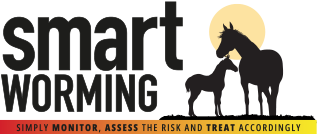NEW worming guidelines: Discover the right de-wormer for your horse this Autumn
As the autumn season approaches, many of us will purchase a de-wormer for our horses. In the past, it was recommended to routinely treat encysted redworms, large redworms, bots, and tapeworms at the end of the grazing season.
However, the release of the new CANTER guidelines in October 2024 further emphasises the advice provided in other recent recommendations to move away from routine de-worming in order to combat the spread of resistance and preserve our ability to effectively treat worm infestations in the future.
Choosing the right de-wormer for your horse today is a decision that will affect
horse welfare in the future
We know that understanding risk levels and worm egg counts can be a little confusing, so to assist you in navigating this process our vets at smartworming have provided you with this simple to use guide to de-worming your horse this autumn.
1. Firstly, consider whether your horse needs treatment for encysted redworm:
(a) If your horse is 5 or under they may be at risk from encysted redworms so routine treatment with moxidectin or 5-day fenbendazole should be considered.
(b) If your horse is over 5, the new guidelines confirm that encysted redworm treatment is not necessary for most adult horses. Unless this is a specific concern in your horse, treatment with a moxidectin product is not indicated.
2. Secondly, perform a faecal egg count (FEC) and tapeworm test now, at the end of the grazing season. This will help inform what treatment your horse needs.
(a) If your horse has a high FEC, or if your horse has a low FEC but hasn’t been de-wormed this year at all, administering a product containing ivermectin or Pyrantel may be appropriate. As well as treating small redworms and bots, ivermectin also treats large redworms which (although less common) can cause serious illness.
(b) If your horse has a positive tapeworm test, praziquantel is recommended to treat this.
Horse wormers containing these active ingredients are classified as needing a prescription from any Registered Qualified Person (vet, pharmacist, or SQP).






